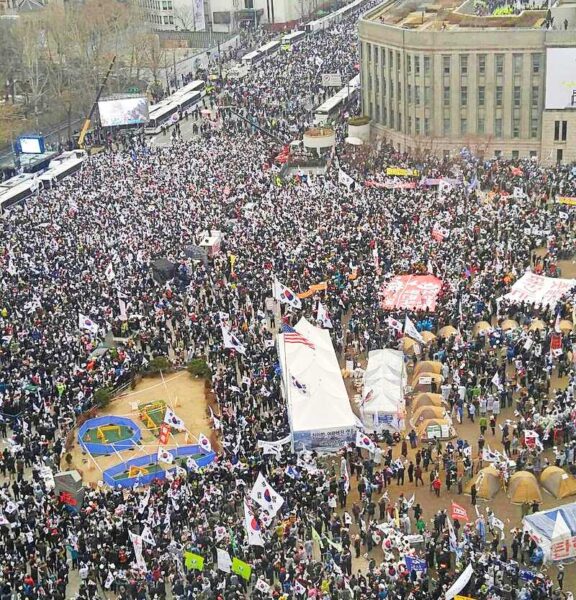It’s tempting to compartmentalize resistance to Donald Trump as existing solely on the left. But the reality is more complex and unprecedented.
Imagine a weird bell curve. On one side, you’ve got traditional conservatives raising eyebrows but taking little action. On the other, centrists, shifting uncomfortably in their seats. And in the middle? That’s where you’ll find the liberal bloc, anxiously pondering a dystopian future.
This isn’t partisan politics as usual – it’s a broad coalition that, so far, can’t recognize itself as such. They’re all worried about the foundations of U.S. democracy. They agree that the bare minimum is preventing a second Trump term; that the real goal is to send a message to future political parties that this candidacy was a national mistake.
Lessons from South Korea
To understand how to effectively channel this diverse U.S. opposition, we might find inspiration in an unexpected place: South Korea, a country known for its vibrant pop culture and rich traditions.
In 2016, South Koreans faced their own political crisis and responded with a protest movement that was as effective as it was innovative. They took to the streets to protest against a major corruption scandal involving then-President Park Geun-hye and demand her resignation.
These weren’t typical protests. They were more like festivals of democracy. Families showed up with picnic baskets. Artists turned streets into galleries. The atmosphere was charged with creativity and civic engagement.
A diverse coalition joined together – business owners, students, religious communities, labor unions, the elderly, civil society organizations, and families. Opposition political parties and activists provided a framework, while artists and celebrities used their platforms to amplify the message. This coalition showcased the unifying power of the country’s anti-corruption and pro-democracy movement.
Notably, after each demonstration, participants cleaned up the streets, leaving them better than before. This level of organization and respect for public spaces helped maintain public support and countered efforts to portray the protesters as disruptive.
Now imagine if we did that here. Picture a summer and fall of rallies where you can register to vote and get your face painted. Where constitutional scholars open for indie bands. Where families come for the bouncy house and stay for the democracy.
It’s worth noting that South Korea’s experience with popular resistance extends beyond this recent scandal. From the Gwangju Uprising in 1980 to the massive protests that toppled the military dictatorship in 1987, Koreans have repeatedly taken to the streets to demand change. They’ve built a tradition of civic engagement that puts most of us to shame.
And here’s the crucial part: Korean protesters don’t just show up once. They keep coming back, week after week, month after month, maintaining constant pressure on their political system. They understand that challenging entrenched political interests isn’t a sprint – it’s a marathon.
A Call to Action
Let’s be clear about what we’re facing. We have a major political party supporting a candidate who threatens our democratic norms and institutions. A candidate who has been convicted of multiple felonies and is facing more charges, including trying to overturn a legitimate election. He admires authoritarian leaders and has suggested using the Justice Department to go after political opponents. His words often inflame racial tensions and encourage extremist groups. He has been found liable in a civil case for sexual abuse, has a history of inappropriate comments about women (including his own daughter), and had ties with convicted sex offender Jeffrey Epstein. Most worryingly, he has shown contempt for democratic processes, including refusing to commit to a peaceful transfer of power. This isn’t just about policy disagreements—it’s about the very foundations of our republic.
So what can we do? We can refuse to let this become normalized. We can consistently highlight the concerns about this candidate’s fitness for office, making it impossible to ignore. We can remind people, every day, that this situation is not typical, not acceptable, and not representative of our nation’s ideals.
We need to prepare for a long-term campaign. We need to build momentum over time, not just rely on a single event or moment of outrage. We need to make it clear that putting forward such a candidate isn’t just a political misstep – it’s a challenge to what our democracy stands for.
We can learn from the Korean example. We can create an opposition movement that’s inclusive, persistent, fun, and focused on protecting our democratic institutions.
Imagine protests so welcoming, so positive, that they become the hottest ticket in town. Where people from all walks of life come together and say, “Hey, maybe we should take this whole democracy thing seriously.”
The power to shape our nation isn’t just in Washington. It’s in our streets, communities, and each of us. It’s time for concerned citizens of all stripes – left, right, and center, celebrities and everyday folks alike – to embrace that power and use it to ensure the health of the republic.


